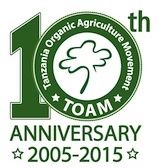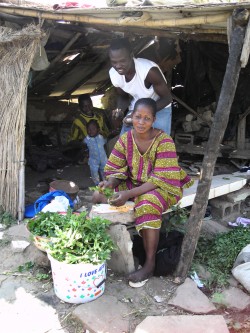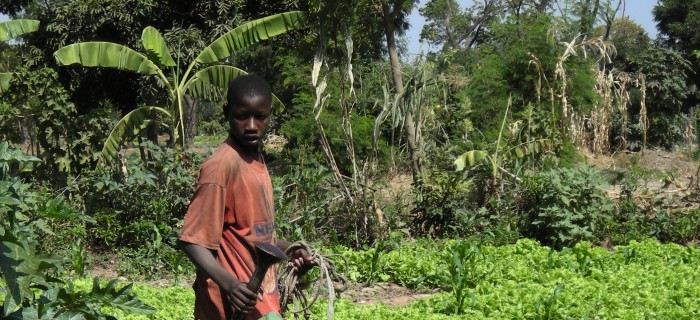Farmers Managed Seed System in Tanzania
This study was commissioned by Tanzania Organic Agriculture Movement and carried out by The Bureau for Agricultural Consultancy and Advisory Services (BACAS) of Sokoine University of Agriculture (SUA) led by Professor Joseph Hella.
Executive Summary
This report was commissioned by Tanzania Organic Agriculture Movement as part of the Seeds of Freedom project, supported by Rosa Luxemburg Stiftung with funds from German Federal Ministry for Economic Cooperation and Development (BMZ).
The Seeds of Freedom project aims to address the issues of farmer managed seed systems in Tanzania in two main ways:
- by supporting farmers to engage directly with policy makers to advocate more effectively for change;
- by developing a strategy and action plan for a programme of action aimed at supporting farmer managed seed systems, building on the strengths of the farming community
The Seeds of Freedom project seeks to gain a clear understanding of the status of the farmer managed seed system, the challenges it faces, and the opportunities for improvement. Policy barriers to farmers’ rights will be identified along with opportunities for policy advocacy. Practical needs of farmers engaged in the farmer managed seed system be identified, along with recommendations for action to improve farmers’ effectiveness, and to strengthen their ability to engage in advocacy at local and national level. 
Tanzania Organic Agriculture Movement (TOAM) commissioned the Bureau for Agricultural Consultancy and Advisory Services (BACAS) of Sokoine University of Agriculture (SUA) to undertake a Study of Farmer Managed Seed Systems in Tanzania.
The Objective of the Farmer Managed Seed Systems (FMSS) Study was to shed light on the operation, benefits, success, and challenges of the farmer managed seed systems in Tanzania and the support needed. It also aimed at gaining a clear understanding of the status of the farmer managed seed system, the challenges it faces and the opportunities for improvement. Furthermore, the study aimed to identify barriers’ to farmers’ rights and opportunities for policy advocacy and shed light on the practical needs of farmers engaged in farmer managed seed system.
Stay in the loop with Food First!
Get our independent analysis, research, and other publications you care about to your inbox for free!
Sign up today!Specifically, the study aimed to:
- Unpack, understand and document the farmer managed seed system including the quality declared seed (QDS) system,
- Explore and document the justification for support for the farmer managed seed systems,
- Reveal how the farmer managed seed systems benefit farmer communities (in terms of food security, livelihoods, nutrition, health, democracy, food sovereignty etc),
- Analyse and document the extent to which the farmer managed seed systems are supported / not supported by national policy and legislation,
- Document the successes of the FMSS and the challenges they face,
- Identify how the FMSS can be supported, and by whom.
The main target audiences for the study findings are policy makers along with donors and the private sector, as well as farmers, farmers’ organisations and civil society actors who will share the findings of the research and advocate for policy change.
KEY FINDINGS
Maize was observed to be the most relied-upon crop in all agro-ecological zones. For instance, it was reported by 100% of respondents in Chunya, Iramba, Kasulu, Kongwa, and Siha Districts; over 93% in Mkuranga and Mvomero; and 70% in Igunga. Beans were the second most important crop as reported by over 93% respondents in Chunya and Kasulu; and over 83% in Siha District. Paddy was also mentioned to be the most important crop (100% in Igunga and 50% in Mkuranga). Furthermore, cassava was an important crop for Mkuranga District. Generally maize, paddy and beans are treated as both food and income crops in almost all districts surveyed.
The Farmer Managed Seed System (FMSS) was the major source of seed in all agro- ecological zones in most of the crops grown. For instance almost 99% of paddy acres, over 93% of groundnut acres, about 93% of bean acres, over 62% sunflower acres and about 68% of all other crops cultivated were sown with seed from FMSS. However, the trend was different for maize and vegetables. The findings indicate that 45% of vegetable and about 46% of maize acres cultivated were planted with FMSS. This means 55% of vegetable acres and about 55% of maize acres were sown with seed from ‘formal’ (commercial) sources.
FMSS is perceived by farmers in all agro-ecological zones to be beneficial. The first benefit of FMSS reported by farmers was cheap source of seed (affordability). This was reported by about 60% respondents in Chunya, 68% in Kasulu, 80% in Kongwa, and over 93% in Mkuranga. The second benefit reported by the farmers was seed availability as reported by 90% respondents in Igunga and Mvomero, 80% in Iramba, about 87% in Kasulu, over 93% in Mkuranga, and over 83% in Siha and Chunya.
Generally, in all agro-ecological zones it is indicated that seed from FMSS are the most affordable (over 67%) and available (about 83%). Also, results indicated that seeds from FMSS are reliable though at different levels. For instance 80% respondents in Kasulu, 50% in Igunga, Siha and Chunya and about 57% in Iramba reported that seed from FMSS are reliable.
The findings in all agro-ecological zones indicate that FMSS receive little or no attention from agricultural extension officers. For instance almost all respondents (close to 97%) in Igunga and majority in Chunya (about 76%), Iramba (70%), Mkuranga (70%) and Siha (70%) have received advice from agricultural extension officers to use seed from the formal system when sowing. Furthermore, the findings indicate that in all agro-ecological zones over 71% of respondents are not encouraged by extension agents to use seed from FMSS. Similarly a review of the National Agricultural Policy of 2013, Seeds Act No. 18 of 2003 with its amendments made in 2014, and the Seeds Regulations of 2007 indicated that seed from FMSS is disregarded in the seed legislation.
In all agro-ecological zones FMSS is reported to be successful whereby about 62% of farmers interviewed indicated that FMSS is successful. However, across the district there are variations on how farmer managed seed system is successful. For instance over 83% farmers in Igunga, 80% in Kasulu and 70% in both Mkuranga and Siha reported FMSS to be successful. Despite the fact that FMSS is successful it faces some challenges including difficulties in getting seed when crop fail (43%) and pests and diseases that destroy seeds especially during storage (26.9%).
Training was found to be the major kind of support which farmers need in order to improve their FMSS. Over 80% of farmers indicated that training on seed production from their own saved seed would solve most of the challenges they face. Also, over 90% and about 31% of respondents indicated that the government and research institutions respectively can support farmers to improve FMSS.
CONCLUSIONS
Generally FMSS remains the main reliable, affordable and widely used source of seed to most of the farmers in all agro-ecological zones. This is because formal seeds for most of the crops cultivated in all agro-ecological zones, with the exceptions of maize and vegetables, are not readily available. Even though some crops have seed from formal sources their availability, reliability, and quality remain uncertain. Therefore, improving and sustaining FMSS presents a huge potential of having effective seed systems that meet the needs of smallholder farmers.
KEY RECOMMENDATIONS
Based on the findings above the following recommendations are put forward:
- a) Provide farm level training on seed selection, multiplication, storage, protection, use and wider distribution of FMSS systems; this can make a huge impact on production through informal seed systems.
- b) Government through Extension services should provide support to practitioners of FMSS so that they can continue to produce quality seed, which are depended upon by the majority of smallholder farmers in Tanzania. To realise the benefits of FMSS there is a need for farmers to be trained on the number of times they may recycle their own seeds.
- c) Policy makers ought to rethink and provide special allowance to recognize and support FMSS.
- d) Government should emphasise and revive production of quality declared seed (QDS) as an approach towards widespread use of improved seeds in Tanzania.


 Help Food First to continue growing an informed, transformative, and flourishing food movement.
Help Food First to continue growing an informed, transformative, and flourishing food movement.




